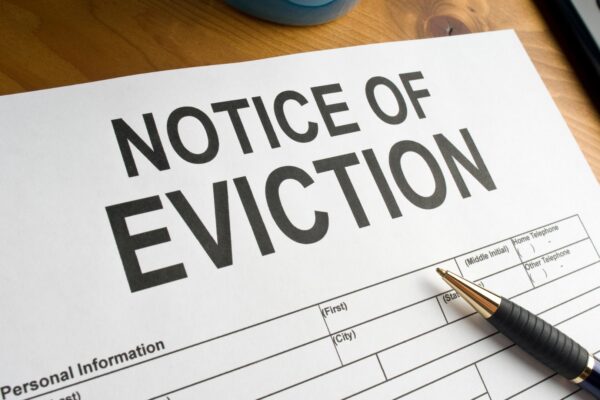For years, Section 21 has been a controversial pillar of the private rental sector, giving landlords a means to regain possession of their properties without needing to prove fault.
Now, with its abolition on the horizon, we are moving into a world where landlords must rely solely on Section 8 to regain possession of their properties.
But what does this mean in reality for landlords, tenants, and the rental market as a whole? Will the government’s vision of a more secure and stable private rental sector come to fruition, or are we walking blindly into a crisis that benefits no one?
- The landlord perspective – a system stacked against them
- The tenant perspective – more security but at what cost?
- The court system
Need legal help with an eviction? We’ll put you in touch with professionals who know the process inside out. Get Legal Advice Today
The landlord perspective – a system stacked against them
With the removal of Section 21, landlords will no longer have the flexibility to regain possession of their properties without justification. Instead, they will need to navigate a legal system that is already struggling under immense pressure.
The promise of improved possession grounds under Section 8 is little consolation when landlords are already facing delays of up to 15 months for a possession order.
The key challenge for landlords is control. Many have built their portfolios on the understanding that they could regain possession when necessary, whether due to financial reasons, personal circumstances, or tenant issues.
With that option gone, many will think twice before renting out properties in the first place. The result, as we have already seen, is a further reduction in rental stock, driving up competition and making it harder for tenants to secure a home.
Additionally, landlords will be more inclined to pursue legal action for rent arrears rather than writing them off as they often did when Section 21 was an option.
This means more tenants will find themselves subject to formal court proceedings, increasing their financial stress and the burden on an already overwhelmed court system.
You might also be interested in…
- How to Calculate Pro Rata Rent
- How Much Can a Landlord Increase Rent in 2025?
- EICR Explained: Electrical Safety Certificates for Landlords
- Going Periodic: What Happens When a Tenancy’s Fixed Term Ends?
- How Landlords Can Manage Summer Turnover With Fewer Disputes
The tenant perspective – more security but at what cost?
The abolition of Section 21 has been championed as a victory for tenants’ rights, and in some respects, it is. No longer will renters face the uncertainty of being asked to leave their home without cause.
This added security allows tenants to put down roots, plan for the future, and avoid the stress of sudden moves.
However, having worked in this industry for many, many years, the reality is more complicated. A rental market without Section 21 may see landlords becoming far more selective about who they rent to, introducing stricter affordability checks and risk assessments.
Those with lower incomes, self-employed individuals, or tenants with less-than-perfect rental histories will likely find it even harder to secure a home.
At the same time, landlords may increase rents to mitigate potential risks, as the process of regaining possession will become more difficult.
Ultimately, a policy designed to protect tenants could inadvertently make renting even more expensive and competitive.
The court system
I cannot say this enough. The success of any rental reform hinges on an efficient court system, and yet we are heading into this new era with one that is already on its knees.
The government has promised to improve possession grounds and speed up legal proceedings, but without dedicated housing courts and substantial investment, the backlog will only worsen.
Local authorities will also be placed under increased strain. With landlords facing longer wait times to regain possession, more tenants will remain in situ until eviction, increasing homelessness claims and putting additional pressure on council resources.
The knock-on effect will be significant, impacting both social housing availability and local government budgets.
There is no doubt that tenants deserve greater security, and rogue landlords should not have the power to evict tenants unfairly.
However, a rental market without Section 21 must be accompanied by meaningful reforms that protect both tenants and good professional landlords.
Feel in control of your tenancies with our all-inclusive tenancy creation and management tool. Discover Rent Now
This includes:
- A properly funded and efficient court system to make sure landlords can regain possession in a reasonable timeframe when justified
- Clear and enforceable grounds for possession that balance tenant protections with landlords’ rights to manage their properties
- Incentives for landlords to remain in the sector, such as tax breaks or regulatory simplifications, to prevent an exodus of rental properties
This is not just about giving landlords what they want, but about creating a fluid market where both sides feel equally supported.
As I have said time and time again, without private landlords, there is no rental market. If smaller landlords continue to leave and are replaced by large corporate investors, tenants will lose the flexibility and personal relationships that often come with independent landlords.
Corporate landlords operate on rigid policies, with less room for negotiation on rent, tenancy terms, and individual circumstances.
While this might work for some, such a shift would make renting more impersonal and transactional, reducing the options available to tenants who value a more tailored approach to their housing needs.
The abolition of Section 21 is a defining moment in the evolution of the private rental sector. But unless the government takes the right action to support landlords and fix the court system, I believe the consequences will be severe.
A rental market with fewer homes, higher rents, and a sluggish legal process benefits no one – not tenants, not landlords, and not the wider housing system.
We must move forward with our eyes open. If policymakers fail to get this balance right, they risk turning a well-intended reform into a crisis of their own making.
Note: This is an opinion piece written by Paul Shamplina, founder of Landlord Action. The views expressed are based on his extensive experience in the industry and do not constitute legal or financial advice. Readers should seek professional guidance before making any decisions.



